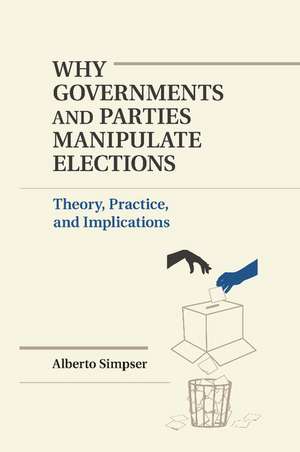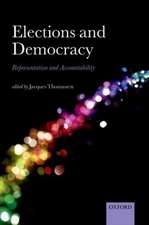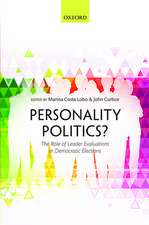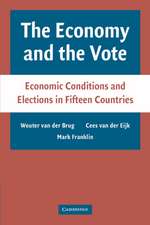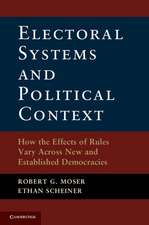Why Governments and Parties Manipulate Elections: Theory, Practice, and Implications: Political Economy of Institutions and Decisions
Autor Alberto Simpseren Limba Engleză Paperback – 29 oct 2014
| Toate formatele și edițiile | Preț | Express |
|---|---|---|
| Paperback (1) | 287.66 lei 6-8 săpt. | |
| Cambridge University Press – 29 oct 2014 | 287.66 lei 6-8 săpt. | |
| Hardback (1) | 695.06 lei 6-8 săpt. | |
| Cambridge University Press – 17 mar 2013 | 695.06 lei 6-8 săpt. |
Din seria Political Economy of Institutions and Decisions
-
 Preț: 133.60 lei
Preț: 133.60 lei -
 Preț: 208.93 lei
Preț: 208.93 lei -
 Preț: 235.99 lei
Preț: 235.99 lei -
 Preț: 200.85 lei
Preț: 200.85 lei -
 Preț: 211.84 lei
Preț: 211.84 lei -
 Preț: 231.82 lei
Preț: 231.82 lei -
 Preț: 306.68 lei
Preț: 306.68 lei -
 Preț: 208.14 lei
Preț: 208.14 lei -
 Preț: 177.53 lei
Preț: 177.53 lei -
 Preț: 295.55 lei
Preț: 295.55 lei -
 Preț: 236.43 lei
Preț: 236.43 lei -
 Preț: 265.11 lei
Preț: 265.11 lei -
 Preț: 228.38 lei
Preț: 228.38 lei -
 Preț: 281.49 lei
Preț: 281.49 lei -
 Preț: 285.37 lei
Preț: 285.37 lei -
 Preț: 279.98 lei
Preț: 279.98 lei - 14%
 Preț: 773.75 lei
Preț: 773.75 lei -
 Preț: 233.38 lei
Preț: 233.38 lei -
 Preț: 247.41 lei
Preț: 247.41 lei -
 Preț: 203.12 lei
Preț: 203.12 lei -
 Preț: 230.33 lei
Preț: 230.33 lei -
 Preț: 286.69 lei
Preț: 286.69 lei - 14%
 Preț: 790.57 lei
Preț: 790.57 lei -
 Preț: 265.32 lei
Preț: 265.32 lei - 11%
 Preț: 554.15 lei
Preț: 554.15 lei -
 Preț: 287.07 lei
Preț: 287.07 lei - 11%
 Preț: 700.20 lei
Preț: 700.20 lei -
 Preț: 273.13 lei
Preț: 273.13 lei -
 Preț: 459.84 lei
Preț: 459.84 lei -
 Preț: 280.35 lei
Preț: 280.35 lei -
 Preț: 260.11 lei
Preț: 260.11 lei - 11%
 Preț: 640.30 lei
Preț: 640.30 lei -
 Preț: 286.89 lei
Preț: 286.89 lei -
 Preț: 247.80 lei
Preț: 247.80 lei - 11%
 Preț: 691.81 lei
Preț: 691.81 lei -
 Preț: 287.48 lei
Preț: 287.48 lei - 11%
 Preț: 641.80 lei
Preț: 641.80 lei - 11%
 Preț: 635.32 lei
Preț: 635.32 lei -
 Preț: 271.01 lei
Preț: 271.01 lei -
 Preț: 265.70 lei
Preț: 265.70 lei
Preț: 287.66 lei
Nou
Puncte Express: 431
Preț estimativ în valută:
55.04€ • 57.62$ • 45.54£
55.04€ • 57.62$ • 45.54£
Carte tipărită la comandă
Livrare economică 05-19 aprilie
Preluare comenzi: 021 569.72.76
Specificații
ISBN-13: 9781107448681
ISBN-10: 1107448689
Pagini: 304
Ilustrații: 12 b/w illus. 20 tables
Dimensiuni: 152 x 229 x 17 mm
Greutate: 0.45 kg
Editura: Cambridge University Press
Colecția Cambridge University Press
Seria Political Economy of Institutions and Decisions
Locul publicării:New York, United States
ISBN-10: 1107448689
Pagini: 304
Ilustrații: 12 b/w illus. 20 tables
Dimensiuni: 152 x 229 x 17 mm
Greutate: 0.45 kg
Editura: Cambridge University Press
Colecția Cambridge University Press
Seria Political Economy of Institutions and Decisions
Locul publicării:New York, United States
Cuprins
Preface: more than winning; 1. Introduction and overview; 2. Electoral manipulation: what it is and how to measure it; 3. The puzzle of excessive and blatant manipulation; 4. More than winning: the consequences of excessive and blatant electoral manipulation; 5. The strategic logic of electoral manipulation; 6. The theory at work: evidence from case studies; 7. Indirect effects of electoral manipulation: quantitative evidence; 8. Conclusion.
Recenzii
'In compelling fashion, Alberto Simpser's Why Governments and Parties Manipulate Elections successfully upends the conventional wisdom that election fraud is only about winning elections. With an elegant theory and original data, Simpser shows us that the information provided by manipulated elections may be just as influential as stolen votes, and they can significantly change political participation and perceptions of power. This comprehensive explanation of the causes and consequences of election manipulation throughout the world represents a major contribution to the field.' Susan D. Hyde, Yale University
'Why Governments and Parties Manipulate Elections develops a theory of electoral manipulation that moves the informational role of manipulation to center stage. The 'informational turn' it proposes represents a significant advance in the comparative study of electoral fraud. Most studies on electoral malpractice stress its material effects: governments manipulate elections to win them. Alberto Simpser, by contrast, highlights its communicative role: governments manipulate elections to send messages of strength and resolve. Theoretically innovative and empirically rich, the book offers a commendable blend of formal modeling, statistical analysis, and case studies. It is obligatory reading for all students of elections, political manipulation, and authoritarianism.' Andreas Schedler, CIDE, Mexico City
'Why Governments and Parties Manipulate Elections develops a theory of electoral manipulation that moves the informational role of manipulation to center stage. The 'informational turn' it proposes represents a significant advance in the comparative study of electoral fraud. Most studies on electoral malpractice stress its material effects: governments manipulate elections to win them. Alberto Simpser, by contrast, highlights its communicative role: governments manipulate elections to send messages of strength and resolve. Theoretically innovative and empirically rich, the book offers a commendable blend of formal modeling, statistical analysis, and case studies. It is obligatory reading for all students of elections, political manipulation, and authoritarianism.' Andreas Schedler, CIDE, Mexico City
Notă biografică
Descriere
This book documents the widespread use of blatant and excessive manipulation of elections and explains what drives this practice.
